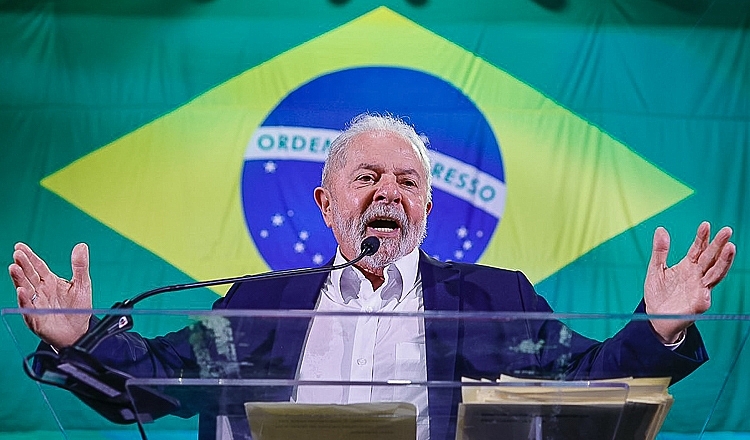A few hours after the results of the election showed Luiz Inácio Lula da Silva (Workers’ Party) as Brazil’s next president, starting on January 1, 2023, international articulations had already begun.
Besides being congratulated and recognized as the presidential election winner – Lula is the president-elect with the largest number of votes in Brazil’s history, surpassing 60 million votes –, the leftist politician was contacted by heads of state from different regions to align on a variety of subjects, particularly the environmental issue.
Environmental agenda
Seen as a leader with tremendous ability in foreign policy and as a head of state that has already overcome the challenge of reducing deforestation in the Amazon rainforest, Lula was invited by Egyptian president Abdel Fatah al-Sissi to attend, in person, the 2022 United Nations Climate Change Conference, also known as COP27.
The invitation was not sent to the current Brazilian president. The event will take place next week, between November 6 and 18, in the city of Sharm El Sheikh. Workers’ Party President Gleisi Hoffmann confirmed Lula will attend the conference. On the occasion, he will have the opportunity to discuss in person with heads of state from the Global North the foreign policy agenda of the country’s next government.
Environmental agendas are often mentioned in messages addressed to the president-elect. The subject was cited in congratulatory messages posted on social media platforms by Ursula von der Leyen, president of the European Commission; Joe Biden, President of the United States; the Spanish head of state Pedro Sánchez; and Olaf Scholz, the German chancellor.
Colombian President Gustavo Petro was more emphatic in his message, published on Twitter. He listed four topics that he is interested in developing with the new Brazilian president to align an environmental policy agenda. The first topic is the “resumption of scientific research in the Amazon rainforest”. The second topic is “a new non-violent drug policy”. “America's integrated electricity grid with clean energies” is the third and the last topic is “Latin American economic integration”.
Colombia has the second largest area of the Amazon Rainforest (Brazil has the largest), which includes nine countries, respectively: Brazil, Colombia, Bolivia, Venezuela, Peru, Guyana, Suriname, Ecuador, and French Guiana.
Tweet: "Topics for an agenda with Brazil: 1. The rescue of the Amazon rainforest and its scientific research. 2. The path of a new non-violent anti-drug policy. 3. The integrated electric power grid of America with clean energies. 4. Latin American economic integration"
Germany and Norway also indicated on Monday and Tuesday, respectively, that they intend to unblock money for the Amazon Fund. The money transfers were suspended after the Bolsonaro government unilaterally extinguished two committees that were responsible for managing the fund, breaking the agreement that defined the project's rules.
Perspectives on foreign policy in Lula’s third term
Argentinian president Alberto Fernández, who visited Lula on the day following the election, reiterated his expectations of integration between Latin American countries with a “very influential regional leader”, referring to Lula. As major trading partners, this was a sign that Argentina and Brazil may also count on a new horizon of bilateral relations, which were partially broken by Jair Bolsonaro (Liberal Party). The current president's electoral campaign was heavily supported by disinformation about Argentina and the Peronist government.
As part of his electoral campaign, Lula had already emphasized the importance of regional integration, focusing on Celac (Community of Latin American and Caribbean States), Mercosul, and the G20. At the beginning of the year, when visiting Mexico, Lula discussed these issues with president Andrés Manuel López Obrador. He projected Celac as an interaction block with the European Union, China, and the United States.
Moreover, he advocates for “fairer international trade”, emphasizing partnerships with the United States and the European Union. “We are not interested in trade agreements that condemn our country to an eternal role as a commodity and raw-material exporter”, said Lula in his first statement after winning the elections, highlighting the need for reindustrializing Brazil and investing in the green and digital economy, in addition to exporting know-how.
In his speech, Lula also cited his commitment to restore the respect Brazil had abroad and on foreign policy issues.
“In my trips abroad and in conversations I have with leaders from different countries, what I hear most is that the world misses Brazil (…). [They miss that] Brazil which supported the development of African countries through cooperation, investment, and technology transfer. [That Brazil] Which worked for the integration of Latin America, South America, and the Caribbean, [that Brazil] which strengthened Mercosul and helped to build G20, Unasul, Celac, and BRICS”.
On environmental issues, Lula recalled that in his previous terms, he had achieved an 80% reduction in Amazon deforestation and greenhouse gas emissions. He launched one of the most ambitious proposals in his speech: zero deforestation. “We will resume monitoring and surveillance of the Amazon rainforest and combat any and all illegal activities, whether illegal mining, logging, or illegal agricultural occupation.”
According to Workers’ Party sources, alignments on international articulation are still in the planning stage. Therefore, there are still no further details on new invitations or meetings with representatives of other countries by the president-elect.




